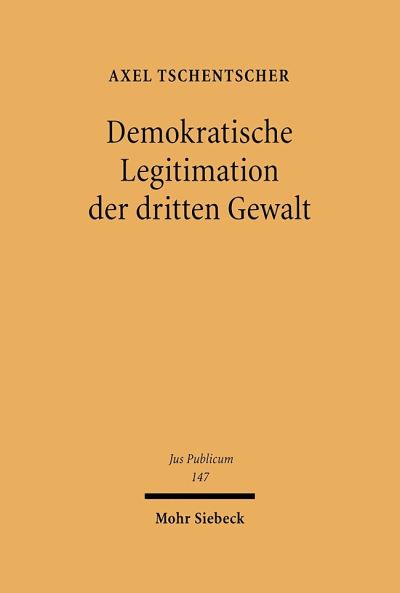
English summary: The judiciary is independent in its decision-making. Axel Tschentscher shows how democratic legitimation as defined by the prevailing formal model of democracy leads to inconsistent results. He outlines an alternative control model as the framework of democracy according to the German Basic Law. This model relies on potential control over the law as the primary criterion for democratic legitimacy. As long as substantive control ist present, the requsite level of legitimation according to the Basic Law can be attained even without the elements of personal and organizational chains of command. The extent to which the lawmaker takes responsibility for the results of judicial decision-making would be underestimated if he were required to actually exercise specific guidance in every field rather than merely retain potential control over the outcome. Regarding judicial selection, the control model provides the Lander with a wide range of procedures meeting the requirements of the German Basic Law; not even elements of cooptation are excluded per se .
German description: Die dritte Gewalt ist im Bereich der richterlichen Entscheidungstatigkeit von Weisungen freigestellt. Axel Tschentscher zeigt, dass die demokratische Legitimation nach dem herrschenden organisatorisch-formalen Modell zu Inkonsistenzen fuhrt. Das Demokratieprinzip des Grundgesetzes interpretiert er im Sinne eines Kontrollmodells demokratischer Legitimation, bei dem die potentielle Inhaltskontrolle als primares Kriterium dient. Das grundgesetzlich gebotene Legitimationsniveau kann bei funktionierender sachlich-inhaltlicher demokratischer Legitimation in einzelnen Bereichen auch ohne das personell-organisatorische Element der Legitimationskette verwirklicht werden. Die legitimatorische Reichweite der richterlichen Gesetzesbindung wurde unterschatzt, wollte man dem Gesetzgeber eine tatsachlich ausgeubte, flachendeckende Steuerung statt bloss potentieller Inhaltskontrolle abverlangen. Nach dem Kontrollmodell bietet sich den Landern ein breites Spektrum grundgesetzkonformer Verfahren der Richterbestellung, unter denen selbst kooptative Elemente nicht von vornherein ausgeschlossen sind.
| ISBN: | 9783161487828 |
| Publication date: | 15th May 2006 |
| Author: | Archie T Wright |
| Publisher: | Mohr Siebeck |
| Format: | Hardback |
| Pagination: | 410 pages |
| Series: | Jus Publicum |
| Genres: |
Constitution |